RCH signed the agreements for another 4-year project period between 2021 and 2024 with HEKS/EPER as part of the Church Cooperation pillar of the Swiss Church Aid of Reformed Church in Switzerland. The project continues the service to asylum-seeking and refugee populations and to the Roma communities in Hungary with the goal of their self-determination, social inclusion and life in dignity.
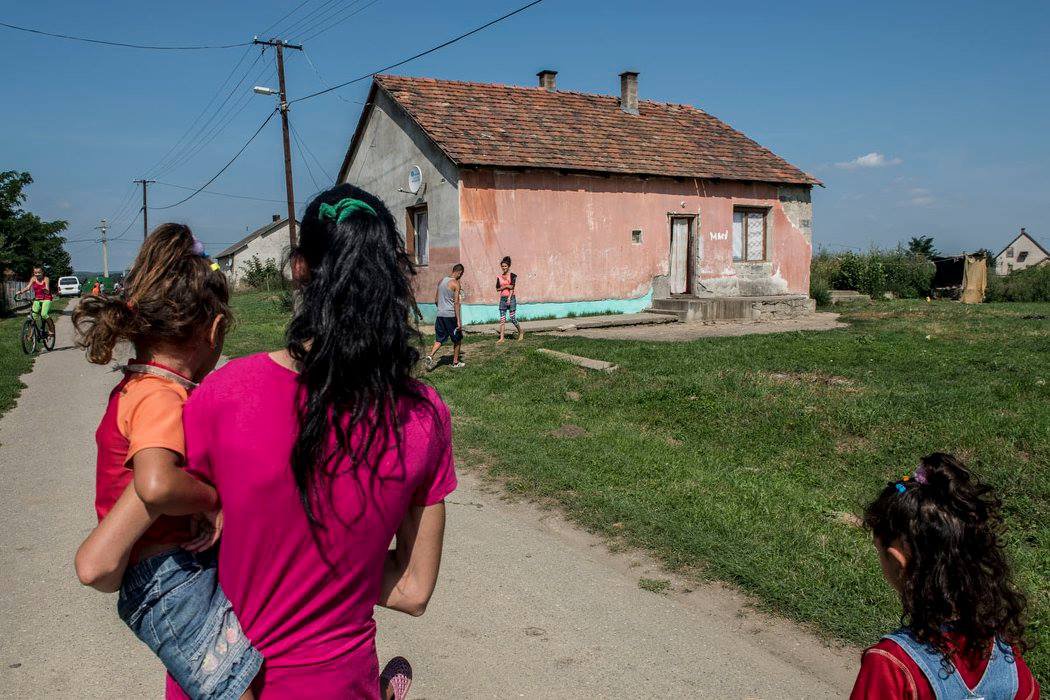
Social inclusion and vibrant church life
In the framework of its international outreach, HEKS/EPER supports rural community development, humanitarian aid and church cooperation projects in more than 30 countries in Africa, Asia, Latin America and Europe. HEKS/EPER runs its own Coordination Office in 17 priority programmes or primary-focus regions.
HEKS/EPER is a Swiss organization formed in 1946 by the Federation of Swiss Protestant Churches. The mission of the organization is to aid socially disadvantaged groups by integrating them into their new society and giving these populations a sense of dignity and self-determination. Church cooperation (CC) is the third pillar of HEKS/EPER's international work beside rural community development, humanitarian aid. In the framework of CC the organisation advises, promotes and accompanies Reformed Churches in Eastern Europe, Italy and the Middle East in their diaconal social work and in building vibrant church communities. The three main goals of the Church Cooperation pillar are expanding the inclusivity to disadvantaged populations, strengthening church life by being relevant to their communities, and maintaining relationships with church partners and Swiss churches. The projects are guided by human-rights, gender equality, and conflict sensitivity-based approaches; principles shared by cooperating partner organisations.
In many Eastern European countries such as Hungary, the Czech Republic, Romania or Ukraine, the Reformed Church is assuming social and societal responsibilities, more specifically by caring for socially disadvantaged people and those bypassed by government social services. With the support of HEKS/EPER, the Evangelical Church in the Czech Republic counsels migrant workers about claiming their rights. In Romania, Hungary and Slovakia, HEKS/EPER supports church community in their projects for the inclusion of the Roma, who face discrimination. In Romania, HEKS/EPER promotes the creation of home care services and supports victims of domestic violence as well as people with disabilities. The Reformed Churches and their institutions are gaining social recognition thanks to their diaconal work.
The growing secularization of society is posing major challenges for HEKS/EPER's partner churches in Eastern Europe. Like the Reformed Churches in Switzerland, their membership too is declining and they must cope with poor infrastructure such as run-down church buildings indispensable to the continued vibrancy of church life. HEKS/EPER therefore promotes various church-run social activities, especially for children and young people.
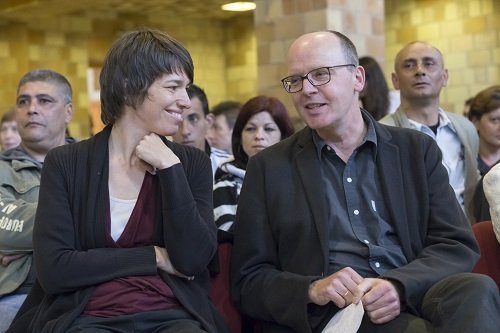
Angela Elmiger current Desk Officer for Eastern Europe and his predecessor, Matthias Herren at a Roma conference in Budapest
Church Cooperation in Hungary: focus on inclusion in Church and Society
HEKS has long supported the RCH in its outreach work to the needy and disadvantaged in society, going back even to the time of communism. The Swiss aid organization in its Church Cooperation program puts a focus on community transformation though congregational involvement – something which the RCH has a vested interest in as well.
A new area stated in 2011 when HEKS and partners from the Central-Eastern European region approved a new strategic and transparent approach to (Inter-)Church Cooperation based on shared values and principles. Based on in-depth evaluation, planning and discernment, which is part of the strategic cooperation, HEKS and RCH are monitoring expected outcomes and results of their joint ministry continuously and define each fourth together the foci of their cooperation, in order to offer Gospel based, value oriented, timely relevant projects meeting critical needs in the ever changing ecclesial, social and political context.
Until 2011, the program mainly focused on reconstruction projects and indiviudal needs. HEKS contributed to the renovation of buildings in congregations, of diaconal and educational institutions, as well as to conference centres of RCH. In 2012, the first four-year Country Program from 2013 to 2016 was developed with the intention to give the program a strong strategic approach and to foster a sense of transparent cooperation, which is part of the strategy of the church and coordinated with its leadership.
Over the past few years HEKS has made it possible, through a vital Country Program, for Reformed congregations and schools to apply for grants in order to serve their Roma communities on a local level. Samewise the Swiss-Hungarian cooperation provided the essential professional and financial contribution for RCH to continue its ministry among Refugee families in a critical social and political context facing growing challenges.
“Because of its large presence it is vital that RCH be a vehicle of vibrant hospitality to vulnerable communities in need, and to transform the public opinion surrounding refugees and Roma populations,” say the project proposals informed by joint values also expressed in founding documents of RCH directing the work of the two ministries.
Welcoming, reconciling and healing power of the Gospel
HEKS has been supporting RCH’s Roma Ministry since 2013 in the framework of the Church Cooperation program. The RCH was about to develop a Roma strategy and, as HEKS already had good experience in North-Hungary with a project for Roma, the RCH and HEKS decided that the objective of the Country Program in Hungary should focus a great deal on the field of Roma inclusion. Joint projects in awarness raising, training and inclusion programs supporting Roma youth and families has been a prirority in past 8 years.
Empowered by the Holy Spirit, the Reformed Church in Hungary as a sign and agent of God’s Kingdom will be a church of personal and social transformation, a community where irrespectively of origin or race, people can experience the welcoming, reconciling and healing power of the Gospel of Jesus Christ.
The aim is to strengthen the Church and its congregations in integrating Roma into Church and society by creating empowering structures and inclusion. Congregations provide educational, life skills, cultural and spiritual programs for disadvantaged families, children, and youth. The project's objective is also to sensitize non-Roma and involve them in activities that support Roma people and help the cooperation of the two ethnicities. Additionally, reformed schools are supported in developing an action plan to promote the inclusion of children from educationally disadvantaged families in mainstream classes. The teachers are trained on integrative school concepts and teaching methods. To share the school’s experiences in inclusive education, teachers of participating schools take a mentoring role to support new participating schools on their way towards inclusive education.
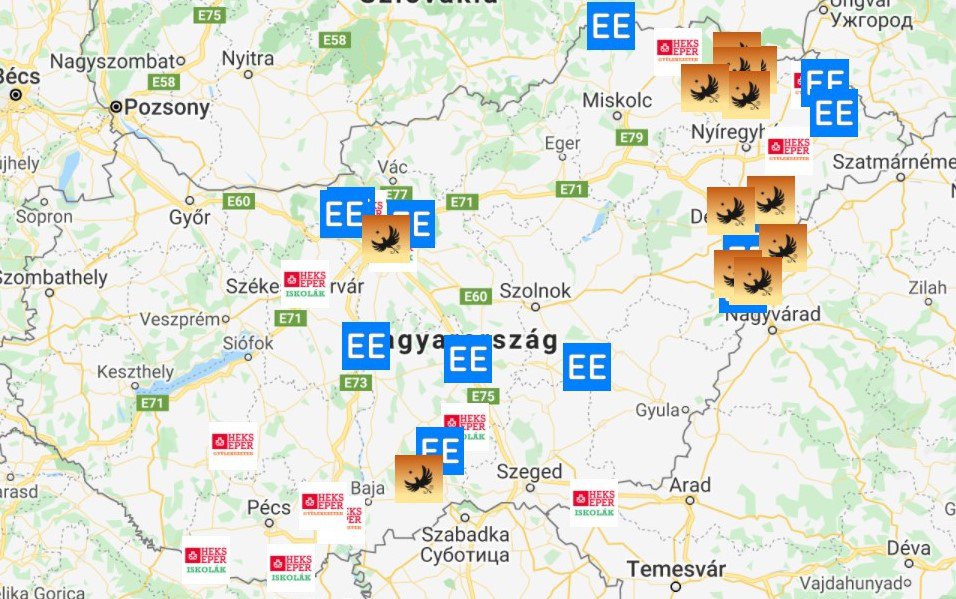
Map of cooperating congregations and institutions
Thus, local actors have been the direct beneficiaries in the Country Program, and so the program helps to support a growing network of involved congregations, pastors and church members.
The biblical commandment of solidarity is unconditional - focus on Refugee and migration
RCH has been working with refugees since 2006 with the founding of its Refugee Ministry, first refugee reception centers were regularly visited by mission workers and volunteers, providing counselling and basic care to the asylum seekers, but also offering services that aimed to improve the relationship with the camp staff and the asylum seekers, such as offering English classes by native English teachers that came to serve through various church partnership programs. In 2008 the Synod adopted the Strategy for the mission among the refugees. Soon the foundations of a basic integration program were put down and the ministry started to grow and offered significant services throughout the years.
2015 saw a large increase of migration and the emergency response capacity of the Hungarian Reformed Church Aid sought to respond quickly and efficiently to the needs of thousands of refugees in the country by providing much needed support. Beside direct aid, at the same time, the refugee ministry went through a restructuring in order to be even more effective and flexible both in terms of answering needs of Refugee families and in accessing ressources provided by the Asylum, Migration and Integration Fund (AMIF) of the European Union. In these uncertain times Kalunba Non-Profit Organisation was set up by the senior staff of RCH’s Refugee Mission, as implementing partner, with the ability to react promptly even in the times without EU funds available thanks to the RCH’s partners solidarity funds. Later became even more crucial since AMIF grants were fully cancelled in 2018.
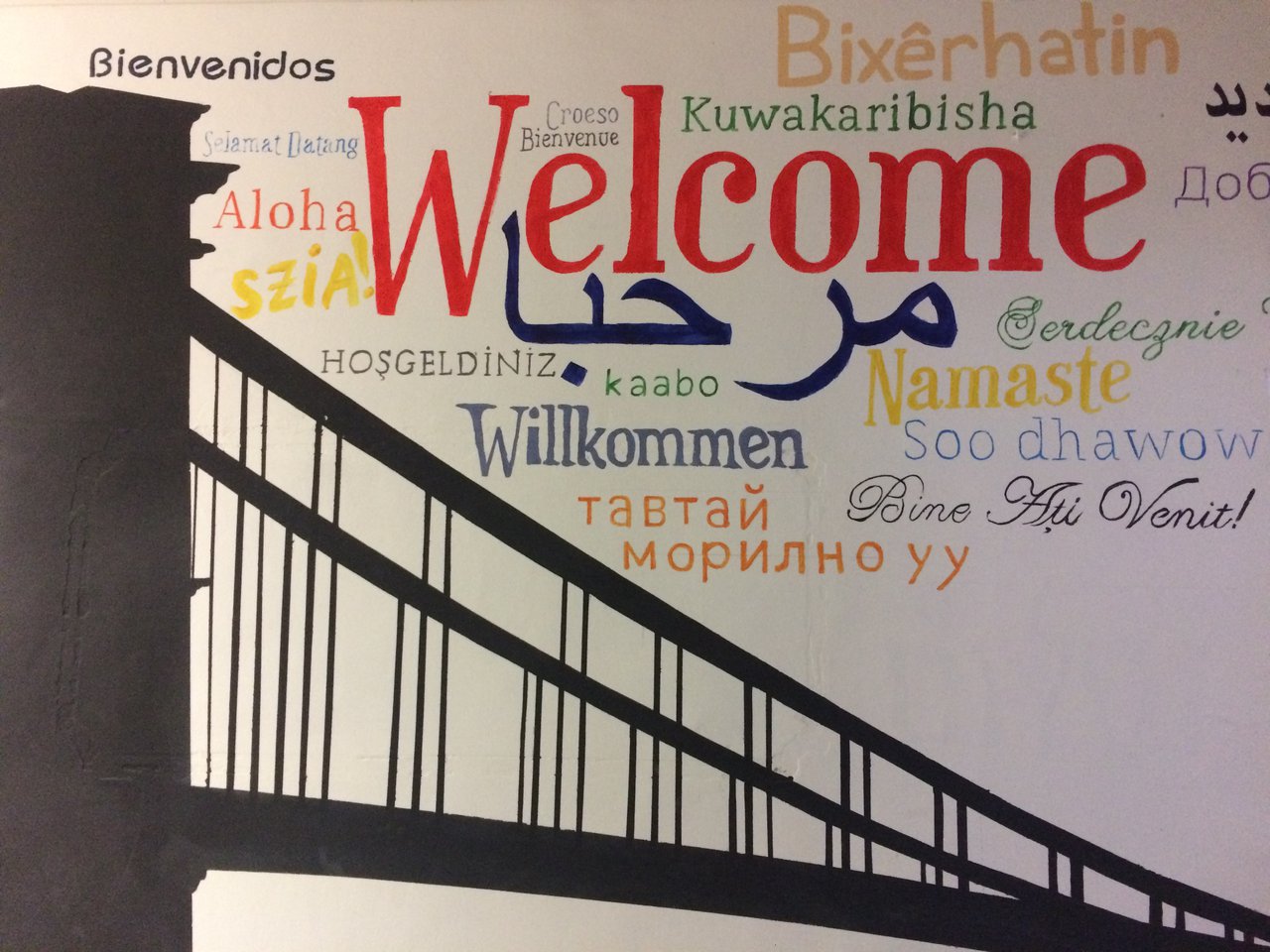
Wall painted by Refugees in the community center of Kalunba
The Presidium of the General Convent, including Bishops and Lay Presidents of the Hungarian Reformed Churches in the so called Carpathian Basin in and around Hungary, issued a statement on the European Refugee Crisis in 2015 which since has served as a guideline in the Church Cooperation with HEKS.
"The biblical commandment of solidarity is unconditional. “Love your neighbor as yourself” (Leviticus 19:18): this applies to everyone, because all human beings are created in the image of God (Genesis 1: 27). Jesus Christ regarded this commandment as the summary of God’s order and the law of life (Matthew 22:37–39) and teaches us that when we help those in need, such as strangers, the sick and prisoners, it mirrors our faith (Matthew 5:43, Matthew 24:31–46). Therefore, our church’s inescapable task is to help people in need: those fleeing from direct threat to life and those coming simply in the hope of a better life. We must help those who are practicing Christianity and those of other faiths; those who have no qualifications and those who are graduates; those are simply travelling through our country and those would like to settle here permanently. We affirm this with the teaching of the Bible, according to which the primary direction of our Christian care and love is the circle of those whose care is entrusted to us: our closer and extended family, our smaller and larger communities, and our nation. We are reminded that we must guarantee the human dignity of refugees and migrants, as well as speedy and fair evaluation of their cases. Likewise, we encourage all people of good will, our responsible leaders and others, to do the same. We thank the aid organizations of our churches and those congregations and church members who have already taken part in this service, and we ask and encourage others to do so always."
The vision expressed in the statement has served as a guideline in RCH’s commintment in this complex and difficult social environment, where recognized refugees and documented immigrants face challenging situations in their daily life due to a deteriorating legal environment, withdrawal of integration services, but also a general erosion in social support that puts marginalized communities in hardship.
Without EU or State funding RCH heavely relies on its international church partners and hope to secure the provision of basic but holistic services for the community. HEKS contributes, among others, to maintaining the education team for the years to come. In addition, the project aims to operate the community center and basic social work as well. „Men and women can be served with counseling regarding: healthcare, employment, aid, renting homes, needed items based on donations, foodbank, citizenship applications. Community events will provide for further learning and leisure opportunities as well,” states the HEKS Project Proposal Promotion of Life Perspectives and Inclusion of Refugees in Hungary. Its main objective is to further develop the commitment, structures and capacities of and within the RCH for the inclusion of refugees and migrants, both by supporting the inclusion of refugees and migrants through an educational program and social work and by sensitizing church members and impacting the public narrative about refugees in Hungary.
The education program focuses on facilitating the inclusion of refugee children into the Hungarian school system through tutoring and afterschool support and by offering courses for adults to improve Hungarian language skills and recognized general education levels – both preconditions for access to the labour market and for qualification for the simplified naturalization process for refugees. Participants in these programs are also supported by social workers who assist them in coping with daily life in Hungary by providing practical advice and support in finding housing and jobs.
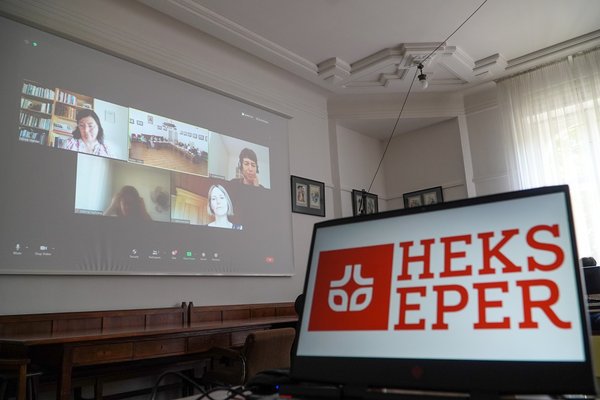
Video conference in July 2020 on evaluation and planning of the HEKS Church Cooperation
Other local and international partnerships are strengthened as well, so that the project will be able to use public community spaces and can count on a steady financial support of international church partners. Furthermore, a focus on staff capacities and wellbeing was added to maintain a psychosocial balance despite shrinking space for this work.
We share the conviction supported by Biblical evidences and the Reformed tradition that “the task of churches to work beyond the ranks of their members and to contribute to society. For this reason, the main objective of HEKS/EPER’s church cooperation is to ensure that Reformed churches are organisations that are relevant within their societies, are open, and play an active and responsible role.” RCH is committed to the Church Cooperation in the awareness that it includes mutual learning and an intense exchange of experience and knowledge. Therefore we welcome opportunities of “dialogue to discuss issues around the topics of Roma inclusion, Refugee inclusion, diversity within the church, human rights based approach and gender equality,” summerizes the letter of endorsement confirming the continued commitment of RCH for the Church Cooperation with HEKS.
The Reformed Church in Hungary, the National Roma and Refugee Ministry and Kalunba are grateful for the moral, professional financial support that HEKS continues to provide to support the refugee community in Budapest and allowing vulnerable populations to find dignity, peace, and joy during a turbulent time. HEKS foresees, thanks to the commitment of Swiss churches, congregations and private persons a financial support of altogether 1.300.000 Swiss francs in the coming four years for the two prioratized projects in Hungary.